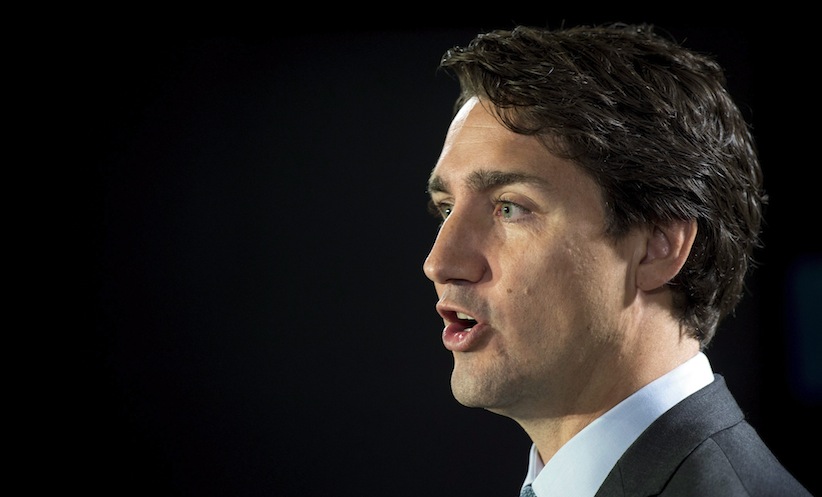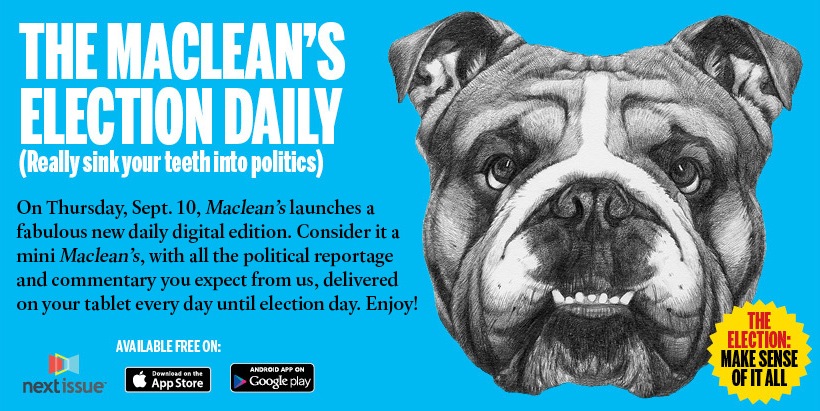Q&A: Toe-to-toe with Justin Trudeau on his latest promises
Cormac MacSweeney interviews Justin Trudeau about the Liberals’ latest policy planks, from Syrian refugees to women in his prospective cabinet
Liberal leader Justin Trudeau responds to a question during a news conference Thursday, September 3, 2015 in Brossard, Que. THE CANADIAN PRESS/Paul Chiasson
Share

CityNews Parliament Hill Bureau Chief Cormac MacSweeney sat down with federal Liberal Leader Justin Trudeau on Wednesday. Listen to the exchange below, or read an edited transcript of their conversation here.
Q: I’ll start off with the announcement that you made today. As part of your infrastructure plan, you want to offer incentives to build affordable housing, mainly rental units. You’re also going to review home prices, however, in major cities such as Vancouver and Toronto. But what can you actually do about that as a federal government?
A: One of the things people are worried about is the increasing cost of home ownership, particularly in some of our major urban centres. Quite frankly, the federal government needs—as it needs to on so many levels—to be a better partner to provinces and municipalities with the challenges their citizens are facing. I think a federal government that collects appropriate data and actually understands what people are challenged with in their daily lives, and in their hopes and dreams, is going to be able to help with municipalities and provinces in addressing various challenges like these.
Q: But where are the teeth? What exactly can you do as a federal government to try to deal with these higher prices?
A: Because we’re talking about very specific jurisdictions with very particular challenges, the most important thing the federal government can do is actually sit down with municipal leaders and provincial premiers to talk about the challenges they’re facing in their particular areas. That’s something I’ve committed to being a much better partner on than this current government, which doesn’t like to talk to other levels of government.
Related: How an economist looks at promises for infrastructure spending
Q: Let’s look at the EI plan you announced yesterday. The Conservatives say your Employment Insurance plan is basically a payroll tax increase, and I guess the question is: How is it not? In the last budget, the Conservatives had already set out that, in 2017, they’d lower the premium to $1.49 per $100 of insurable earnings. You would set the premium at $1.65 instead, which means, come 2017, that would be an increase, and Canadians would not be taking home as much money as they thought they would, as was promised in the budget.
A: This is a great example of the Conservatives not being able to do basic math. Premiums are right now at $1.88. We are going to lower them to $1.65, as of Jan. 1, 2017. As for the Conservatives’ promises, well, in their most recent budget, they promised they’d be balancing the budget, and they’ve failed to do that. So I don’t know why anyone would believe anything they say about what they might do two years from now. We are reducing premiums and increasing the effectiveness of EI in helping people getting back to work, and that’s exactly what Canadians need right across the country.
Q: But why not lower it? Why do you need to keep that $2 billion?
A: The fact is, we need to put that money toward people who need help getting through tough times where they’ve been laid off. That’s what EI is all about, and Mr. Harper’s cuts have actually made it much harder for people who’ve paid into the system to get the benefits for which they are entitled, and that’s wrong. People who pay their benefits should be receiving what they’ve paid into and what they deserve, and not having to be stuck going to food banks and stressed out about whether or not they’re going to be able to feed their kids in the coming weeks.
Q: When Paul Martin was finance minister, he called payroll taxes a cancer on the economy. How do you square that with voters, when they see you could be saving $2 billion, but you’re deciding to keep it, while your opponents say they would cut it?
A: Canadians expect their government to make sure we’re helping the people who need the help and growing the economy, and that’s exactly what we’re committed to do, not just with our historic investments into infrastructure that are going to create jobs while the others are focusing on cuts, but by lowering payroll taxes, by lowering EI premiums from $1.88 to $1.65, at the same time as we make sure that the people who need help are getting the help that they paid into, because they’re not getting it under Stephen Harper. That’s what Canadians expect from their government.
INTRODUCING THE BULLDOG*

Q: Regarding the Syrian refugee crisis, you and your party want to bring in 25,000 refugees as soon as possible. How exactly do you plan to fast-track the system? What sort of checks and balances might be sacrificed as a result of this process? Islamic State members have shown a willingness to go to great length to get access to countries, even faking their own deaths.
A: We’ve seen that Canada has been able, in the past, and will continue to be able, to address the very real security concerns as we bring people over. We did that in the years following the Vietnam War, where there were tremendous concerns about that. What is missing from this particular situation is merely political will. Mr. Harper does not think we need to do more to help vulnerable people around the world. We know that we can and, quite frankly, Canadians want us to do more. That doesn’t mean sacrificing security. The fact that Mr. Harper is talking about it that way is just showing that he’s trying to find any excuse to not do what Canadians feel we should be doing, which is help more people.
Q: What do you think of the tweets from the NDP’s director of communications, Shawn Dearn, who said: “Stop calling the misogynist, homophobic, child-molesting Catholic church a moral authority,” then replied to a tweet from the Pope saying, “Go f–k yourself”? He has apologized since, but we’ve seen in this campaign already leaders calling for other staffers’ resignations based on other issues. Do you think Dearn has to go?
A: I think that kind of language and intolerance is, quite frankly, irresponsible from anyone who wants to help a party get elected. The fact is, Mr. Mulcair needs to make very, very clear that that kind of language is unacceptable within his organization, and it’s more than just an apology that is needed.
Q: So do you think Dearn should be fired?
A: An individual who said hateful things like that would no longer be a part of my organization, but I’ll let Mr. Mulcair make the decision about the kind of people he wants to associate himself with.
Q: Your Liberals and the NDP have criticized the government, the Prime Minister’s Office, specifically, for the centralization of the government in the PMO, mainly involving the Senate scandal. Wasn’t your father credited with creating a lot of that centralization?
A: I think there was something started under my father that I appreciate that it’s time to end, and I like the symmetry of me being the person who actually turns the clock back so that we can have a Prime Minister’s Office and, indeed, a democracy, that actually respects what voters say and is open and transparent. Because, not only does it matter to gain people’s trust, but it matters for quality public policy and governance, and that’s why we’re committed to open and transparent government.
[widgets_on_pages id=”Election”]
Q: About balancing the budget, the NDP has said it’s about not burdening our future generations with debt, and ensuring we can afford important public programs in the future. Isn’t it important for a government to live within its means?
A: Absolutely, but, at this point, when interest rates are low, it’s a time to invest in jobs and growth. Mr. Harper’s failure over the past 10 years is in not creating enough growth. Mr. Mulcair’s decision to cut billions of dollars from our economy when we’re in recession, when Canadians need help, is what’s going to burden future generations. We will balance the budget in 2019, and we’ll do it by investing in the kind of growth needed to get our country back on track after 10 years of Mr. Harper’s failure. I, for the life of me, can’t understand why Mr. Mulcair would choose not to help Canadians who need help, and instead choose cuts and go back on his promises on health care, on transit, and on other things.
Q: But you’ll also be adding to the debt our future generations will have to deal with.
A: Our debt-to-GDP ratio will continue to decrease every year, including the first three years under the Liberal government. That is what we’re focused on. We know we need to invest in the kind of long-term growth and short-term job creation that Canadians expect, and we’re the only party offering to do that.
Q: You’ve pledged in the past to have a cabinet that’s 50 per cent women, but only a third of your candidates are actually women. How are you going to fill that cabinet?
A: We have extraordinary women running for us right across this country, and I look forward to showing that women are needed in positions of power. And I certainly hope that, after people see how effective a cabinet with a gender parity in it is, we’re going to draw even more women into politics in subsequent elections.
Q: What if you don’t have a lot of them voted in as MPs? How could you actually reach that parity level?
A: I am entirely confident that the extraordinary women we have running for us right across this country will make excellent cabinet ministers.